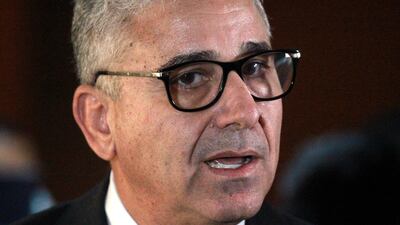Libya’s polarised politics is perilously close to a return to the deeply divided and violent state that characterised its post-2014 civil war years as rival governments look to the UK for support while world leaders continue to push for elections.
Fathi Bashagha, the prime minister appointed in February by the House of Representatives in Benghazi, told UK parliamentarians this week that they should support him and that Britain would benefit from better security, trade and investment opportunities in Libya under his rule.
Speaking via videoconference from the war-ravaged coastal city of Sirte, Mr Bashagha told the foreign affairs committee chaired by Conservative leadership candidate Tom Tugendhat that Libya had become “lawless” under the control of militias supporting the United Nations-backed Prime Minister Abdel Hamid Dbeibah in Tripoli.
Mr Bashagha’s dialogue followed visits to the UK last month where he met some British ministers, including the education minister, Nadhim Zahawi, who is now UK chancellor but not Foreign Secretary Liz Truss.
The former interior minister has been trying to drum up support for his government to take over Tripoli.
Backed by the forces of military strongman Khalifa Haftar, Mr Bashagha has tried to seize power in the capital several times this year only to be pushed back by armed supporters of Mr Dbeibah. He has not been deterred however, saying this week that he was “days away” from entering the Libyan capital.
The UN, the UK and several EU states have urged Libya’s political leaders to resolve the question of authority through elections, which were scheduled for December but then cancelled amid controversy over some of the names on the ballot papers.
Not directly commenting on Mr Bashagha's comments to the MPs, Mr Dbeibah’s diplomat in London told The National the country going to the polls was the way “to get out of the current situation in Libya”.
“Everyone, including our British friends, knows that the solution lies in holding free and fair elections as soon as possible to renew the legitimacy of all bodies,” wrote Libya’s ambassador to the UK in an email.
Ambassador Salah Mrheel said the internationally recognised government of national unity “is calling for and working on” elections and urged the UK to “help and support” them achieve this.
However, critics say Mr Dbeibah’s administration has already failed to deliver its mandate. One of the reasons the December elections were called off was because of controversy over who would stand, including the interim prime minister who had backtracked on earlier promises not to put himself forward as a candidate.
Widespread corruption in the Tripoli administration is increasingly putting off Libyans and international leaders. Then again, Mr Bashagha’s affiliation to Gen Haftar, who lost the war he waged against the internationally recognised government and has been repeatedly accused of war crimes, is no more appealing.
Western powers may find themselves confronted with less of an obvious choice on who to support as violence and corruption re-emerge across the political divide.
The UK has largely chosen not to take sides between them and continues to “urge Libyan political leaders to engage constructively in negotiations” and “to unlock the executive impasse and agree on a pathway to elections”.
Nevertheless, the Russia-Ukraine war, food insecurity and the oil supply threat might yet change the direction and weight of support.
Britain’s ambassador to Libya in 2019, Frank Baker, previously endorsed Mr Bashagha on the basis that oil “alone should serve as a big incentive to improve the situation in Libya” which had become “significantly more important to the UK” since events in Ukraine.
Mr Bashagha’s speech to parliamentarians on Tuesday gave other reasons for the UK to “strengthen co-operation” between them, including investment, trade and stemming migration into Europe.
Balancing the power with Russia, whose involvement in Libya’s east has included the supply of weapons as well as members of the mercenary Wagner Group connected to them, is another motive.
Mr Bashagha said his government supported removing “foreign forces and mercenaries altogether” from Libya.
“We want foreigners to come to help with companies, reconstruction, and investment not forces,” Mr Bashagha told the foreign affairs committee.
“[We] want to work with the UK but we feel unwelcome. On the other hand, Russia accepted our government and wanted to meet with us,” Mr Bashagha told the foreign affairs committee.
“Even though its stability is not only important for Libyans but for all of North Africa and southern Europe ... the British government does not look interested in Libya at the moment.”
However, as a foreign affairs committee member noted at the end of Mr Bashagha’s presentation, the UK government is changing and any one of the current candidates may shift gears and alliances on Libya, or decide it is best to keep Britain standing safely on the sidelines.


